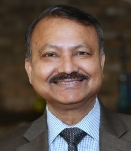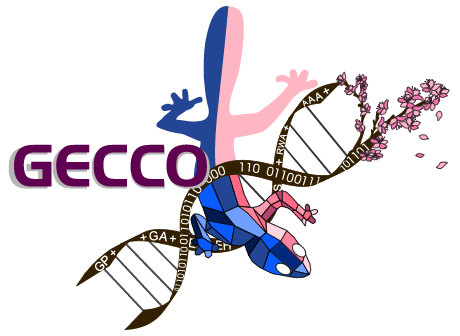Workshop Schedule
Tentative schedule is provided below. Please check the GECCO 2018 website for details.
• Date: Monday, July 16, 2018
• Time: 9:00am - 12:40pm
• Room: Training Room 2 (2F)
• Venue: Kyoto TERRSA in Kyoto, Japan
Keynote
GA-Based User Identity Management
Dipankar Dasgupta, IEEE Fellow, ACM Distinguished Speaker
Director, Center for Information Assurance
Professor of Computer Science
The University of Memphis
Memphis, TN 38111, USA
Email: dasgupta@memphis.edu
Homepage: www.cs.memphis.edu/~dasgupta
Presentation Slides: Link
Authentication with multiple factors is an emerging trend to secure access to the sensitive information of an organization. Multi-factor Authentication (MFA) being used to genuinely identify authorized users through an authentication process via passwords, security tokens, biometrics, cognitive behavior metrics, software/hardware sensors, etc. Existing MFA systems typically use static policies for selecting authentication factors and do not consider dynamic aspects of the operating environment. We developed a GA-based authentication and identity management framework for adaptive selection of multiple modalities at different operating environment so to make authentication strategy unpredictable to the hackers. This methodology, called adaptive multi-factor authentication (A-MFA) incorporates a novel approach of calculating trustworthy values of different authentication factors while being used under different user environmental settings. Accordingly, MOGA-based application is developed to determine an appropriate subset of authentication factors (at triggering events) on the fly thereby leaving no exploitable a priori pattern or clue for adversaries. Empirical studies are conducted with varying environmental settings and the performance of the adaptive MFA is compared with other selection strategies. These results reflect that such a methodology of adaptive authentication can provide legitimacy to user transactions with an added layer of access protection that is not rely on a fixed set of authentication modalities. Robustness of the system is assured by designing the GA-based framework in such a way that if any modality data get compromised, the system can still perform flawlessly using other non-compromised modalities and different operating modes. Scalability can also be achieved by adding new and/or improved modalities with existing set of modalities and integrating the operating/configuration parameters for the added modality. A Patent (#9,912,657, approved on March 6, 2018) on Adaptive Multi-Factor Authentication System is approved/allowed on November 2017.
About the Keynote Speaker
 Dipankar Dasgupta is a Professor of
Computer Science at the University of Memphis. Dr. Dasgupta is at the forefront of research in applying bio-inspired
and GA-based approaches to cyber defense. Some of his groundbreaking works, like digital immunity, negative
authentication, cloud insurance model, and Auth-Spectrum put his name in Computer World Magazine and other News media.
Prof. Dasgupta is an Advisory Board member of Geospatial Data Center (GDC), Massachusetts Institute of Technology
since 2010, and worked on joint research projects with MIT. His latest textbook on Advances in User Authentication
is published by Springer-Verlag, August, 2017.
Dipankar Dasgupta is a Professor of
Computer Science at the University of Memphis. Dr. Dasgupta is at the forefront of research in applying bio-inspired
and GA-based approaches to cyber defense. Some of his groundbreaking works, like digital immunity, negative
authentication, cloud insurance model, and Auth-Spectrum put his name in Computer World Magazine and other News media.
Prof. Dasgupta is an Advisory Board member of Geospatial Data Center (GDC), Massachusetts Institute of Technology
since 2010, and worked on joint research projects with MIT. His latest textbook on Advances in User Authentication
is published by Springer-Verlag, August, 2017.
Dr. Dasgupta has more than 250 publications with 14900+ citations and having h-index of 56 as per Google scholar. Dr. Dasgupta’s earlier works on Structured Genetic Algorithms have been widely cited by evolutionary computation community He received five Best Paper Awards at international conferences (1996, 2006, 2009, 2012 and 2017) and two Best Runner-Up Paper Awards (2013 and 2014). He is the recipient of 2012 Willard R. Sparks Eminent Faculty Award, the highest distinction and most prestigious honor given to a faculty member by the University of Memphis. Prof. Dasgupta received the 2014 ACM SIGEVO Impact Award, and also designated as an ACM Distinguished Speaker. Since 2007 he has been organizing Symposium on Computational Intelligence in Cyber Security (CICS) at the IEEE Symposium Series on Computational Intelligence (SSCI).
List of Accepted Papers for Presentation at the Workshop
Machine Learning – Based Detection of Water Contamination in Water Distribution Systems
- Hadi Mohammed et al. (e-mail), Norwegian University of Science and Technology, Norway
A Genetic Algorithm for Dynamic Controller Placement in Software Defined Networking
- Samuel Champagne et al. (e-mail), Dalhousie University, Canada
Using Evolutionary Dynamic Optimization for Monitor Selection in Highly Dynamic Communication Infrastructures
- Robin Mueller-Bady et al. (e-mail), Frankfurt University of Applied Sciences, Germany
Automated Design of Network Security Metrics
- Aaron Scott Pope et al. (e-mail), Missouri University of Science and Technology, United States of America
Evolution of Network Enumeration Strategies in Emulated Computer Networks
- Sean Harris et al. (e-mail), Missouri University of Science and Technology, United States of America
Genetic Algorithms for Role Mining in Critical Infrastructure Data Spaces
- Igor Saenko et al. (e-mail), ITMO University, Russia
Adversarial Co-evolution of Attack and Defense in a Segmented Computer Network Environment
- Erik Hemberg et al. (e-mail), MIT CSAIL, United States of America
Real-Time Strategy Game Micro for Tactical Training Simulations
- Sushil J. Louis et al. (e-mail), University of Nevada, Reno, United States of America





